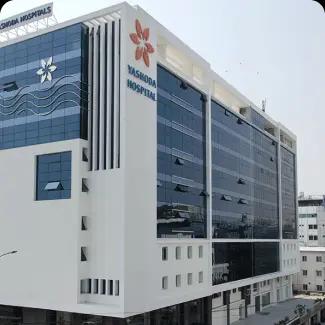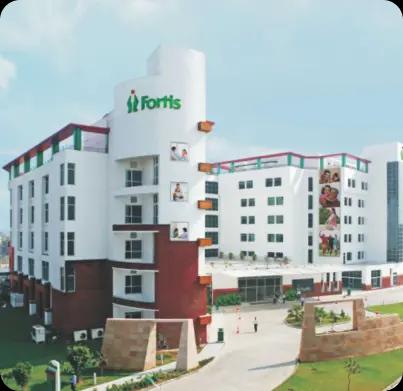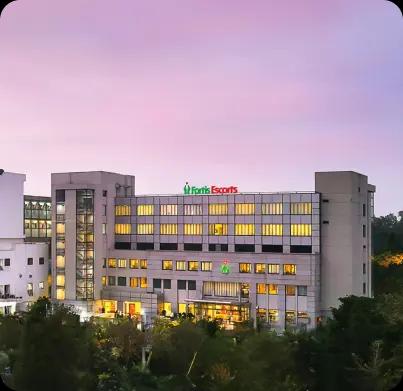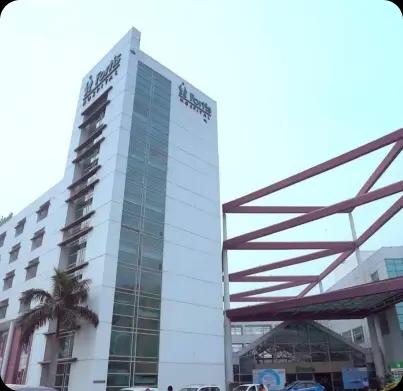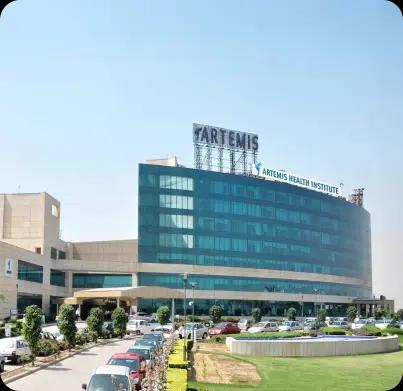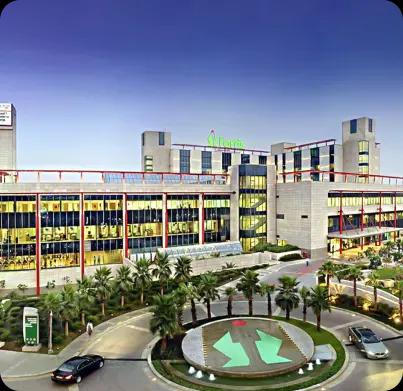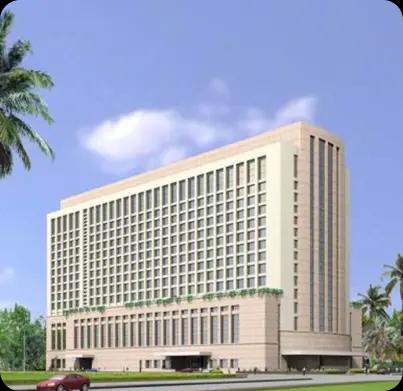
Colectomy
Colectomy, the surgical removal of part or all of the colon is performed to treat various conditions like colon cancer, ulcerative colitis, and Crohn's disease. Symptoms indicating the need for colectomy include abdominal pain, bloating, diarrhea, rectal bleeding, and unintended weight loss. Diagnosis involves colonoscopy, CT scans, and blood tests. Preparation includes bowel cleansing and dietary adjustments. Surgery can be performed laparoscopically or through open surgery. Advanced technology like robotic-assisted surgery is utilized. Recovery involves hospitalization, pain management, and dietary modifications. Follow-up care is essential for monitoring and adjusting to postoperative changes.
Free Pick up and Drop
No Cost EMI
Post Surgery Care
Colectomy, the surgical removal of part or all of the colon is performed to treat various conditions like colon cancer, ulcerative colitis, and Crohn's disease. Symptoms indicating the need for colectomy include abdominal pain, bloating, diarrhea, rectal bleeding, and unintended weight loss. Diagnosis involves colonoscopy, CT scans, and blood tests. Preparation includes bowel cleansing and dietary adjustments. Surgery can be performed laparoscopically or through open surgery. Advanced technology like robotic-assisted surgery is utilized. Recovery involves hospitalization, pain management, and dietary modifications. Follow-up care is essential for monitoring and adjusting to postoperative changes.
Symptoms Of Colectomy
Symptoms
Types of conditions
There are five main types of Colectomy
Partial Colectomy (Segmental Colectomy)
Total Colectomy
Proctocolectomy
Total Abdominal Colectomy
Subtotal Colectomy
Partial Colectomy (Segmental Colectomy)
In a partial colectomy, only a portion of the colon is removed while the rest is left intact. This procedure is often performed to treat conditions such as colorectal cancer, diverticulitis, or Crohn's disease when the affected area is limited. The surgeon removes the diseased segment and reconnects the remaining parts of the colon.
Diagnosis
The diagnosis of colectomy involves several steps to assess the condition of the colon and determine the need for surgical intervention. Common diagnostic methods include:
Medical History and Physical Test
The healthcare provider will review the patient's medical history, including symptoms, previous surgeries, and family history of colon diseases. A physical examination may also be conducted to assess abdominal tenderness, palpable masses, or signs of bowel obstruction.
Colonoscopy
A is a procedure in which a flexible, lighted tube with a camera (colonoscope) is inserted through the rectum into the colon to examine the lining of the colon. It allows for visual inspection of the colon and biopsy of suspicious areas for further evaluation.
Imaging Studies
Imaging tests such as computed tomography (CT) scans, magnetic resonance imaging (MRI), or barium enema may be performed to provide detailed images of the colon and surrounding structures.
Blood Tests
Blood tests may be ordered to assess for signs of infection, inflammation, or anemia, which can be associated with colon diseases requiring colectomy.
Biopsy
During colonoscopy or surgery, tissue samples (biopsies) may be collected from abnormal areas of the colon for pathological examination.
Diagnostic Laparoscopy A diagnostic laparoscopy may be performed to visually inspect the abdominal cavity and assess the extent of disease involvement. This minimally invasive procedure can help guide treatment decisions for colectomy. Based on the results of these diagnostic tests and evaluations, healthcare providers can make informed decisions regarding the need for colectomy surgery and the most appropriate treatment approach for the patient's specific condition.
Causes/Risk Factors
- Inflammatory Bowel Disease (IBD)
- Colorectal Cancer
- Diverticular Disease
- Familial Polyposis Syndrome
- Ischemic Colitis
- Severe Complications of Chronic Conditions
Preparing for Surgery
Preparing for colectomy surgery involves several steps to ensure optimal outcomes and minimize risks. Here's an overview of the preparation process:
Medical Evaluation
The patient undergoes a comprehensive medical evaluation to assess overall health and identify any pre-existing conditions that may affect surgery or anesthesia.
Discussion with Healthcare Team
The patient meets with their healthcare team, including the surgeon, anesthesiologist, and nursing staff, to discuss the surgery, expected outcomes, potential risks, and post-operative care plan.
Bowel Preparation
Bowel preparation is often necessary before colectomy surgery to cleanse the colon and reduce the risk of infection and complications. This may involve dietary restrictions, laxatives, or enemas as prescribed by the healthcare provider.
Medication Management
The healthcare provider may adjust current medications or prescribe new medications to optimize the patient's health before surgery. This may include stopping certain medications that can increase the risk of bleeding or complications.
Nutrition and Hydration
Maintaining adequate nutrition and hydration before surgery is important for overall health and recovery. The patient may receive dietary recommendations or nutritional supplements as needed.
Smoking and Alcohol Cessation
Patients are often advised to quit smoking and limit alcohol intake before surgery, as these substances can impair healing and increase the risk of complications.
Pre-operative Tests
Depending on the patient's medical history and the planned surgical approach, pre-operative tests such as blood work, electrocardiogram (ECG), chest X-ray, or additional imaging studies may be ordered to assess fitness for surgery.
By following these preparation steps, patients can optimize their health and readiness for colectomy surgery, leading to smoother recovery and better outcomes.
Treatment Details
Types The treatment details for colectomy surgery vary depending on the specific type of colectomy performed and the underlying condition being treated. Here are the main types of colectomy procedures and their treatment details:
Partial Colectomy (Segmental Resection)
- Procedure: Surgical removal of a portion of the colon affected by disease while preserving the remaining healthy portions.
- Approach: Can be performed using open surgery, laparoscopic surgery, or robotic-assisted surgery.
- Reconstruction: After removing the diseased portion, the remaining ends of the colon are reconnected (anastomosis) using sutures or staples.
- Outcome: Preservation of bowel continuity and function with removal of the diseased segment.
Total Colectomy
- Procedure: Complete surgical removal of the entire colon.
- Approach: Can be performed via open surgery, laparoscopic surgery, or robotic-assisted surgery.
- Reconstruction: Depending on the underlying condition and patient factors, reconstruction options include:
- Ileorectal Anastomosis: The rectum is preserved, and the small intestine (ileum) is connected to the rectum.
- Ileoanal Anastomosis (J-pouch): The rectum is removed, and an internal reservoir (J-pouch) is created from the small intestine to replace the function of the rectum.
- Ileostomy: In some cases, when reconstruction is not feasible or delayed, the end of the small intestine (ileum) is brought through an opening in the abdominal wall (stoma), and waste is collected in an external pouch (ileostomy bag).
Subtotal Colectomy
- Procedure: Removal of a significant portion of the colon while leaving a portion of the colon or rectum intact.
- Approach: Can be performed via open surgery, laparoscopic surgery, or robotic-assisted surgery.
- Reconstruction: Like partial colectomy, the remaining ends of the colon are reconnected (anastomosis).
Types of Colorectal Surgery
Several advanced technologies are utilized in colectomy surgery to enhance precision, minimize invasiveness, and improve patient outcomes. Here are some of the technologies commonly used:
1.Laparoscopic Surgery - Laparoscopic colectomy involves making several small incisions in the abdomen and inserting a laparoscope (a thin, lighted tube with a camera) and specialized surgical instruments.
This minimally invasive approach allows for magnified visualization of the surgical field and precise manipulation of tissues, resulting in smaller incisions, reduced blood loss, and faster recovery compared to traditional open surgery.
2.Robotic-assisted Surgery - Robotic-assisted colectomy utilizes a surgical robot controlled by the surgeon to perform the procedure with enhanced dexterity and precision.
The robot's arms mimic the surgeon's hand movements, allowing for greater range of motion and access to tight spaces within the abdomen.
3.Advanced Imaging Techniques - Imaging technologies such as intraoperative ultrasound or near-infrared fluorescence imaging can be used during colectomy surgery to enhance visualization of anatomical structures, identify blood vessels, and assess tissue perfusion in real-time.
These imaging modalities help surgeons navigate complex anatomy and ensure optimal outcomes.
4.Energy-based Devices - Energy-based devices such as electrocautery, ultrasonic dissectors, and advanced sealing devices are used to dissect and seal blood vessels and tissues during colectomy surgery. These devices help minimize blood loss, reduce operative time, and enhance surgical precision, leading to improved patient outcomes and faster recovery.
By incorporating these advanced technologies into colectomy surgery, surgeons can optimize outcomes, minimize complications, and improve overall patient satisfaction. It's essential for patients to discuss the available technology options with their surgical team and understand how they may benefit from these advancements.
Recovery
Recovery from colectomy surgery varies depending on factors such as the type of colectomy performed, the underlying condition, and the individual's overall health. However, here is a general overview of the recovery process:
- Hospital Stay After colectomy surgery, patients typically stay in the hospital for a few days to a week, depending on the extent of the surgery and the speed of their recovery.
During this time, they receive pain management, intravenous fluids, and monitoring of bowel function.
- Pain Management Pain at the surgical site is common after colectomy, and medications are prescribed to manage discomfort.
Pain management strategies may include oral pain relievers, epidural anesthesia, or patient-controlled analgesia (PCA) pumps.
- Dietary Progression Initially, patients are kept on a clear liquid diet to allow the gastrointestinal tract to rest and heal.
As bowel function returns and tolerance improves, the diet is gradually advanced to include soft foods and eventually a regular diet.
- Activity Level Patients are encouraged to move around as soon as possible after surgery to prevent complications such as blood clots and respiratory problems.
However, strenuous activities and heavy lifting are typically restricted for several weeks to allow the surgical incisions to heal properly.
- Wound Care Patients are instructed on how to care for their surgical incisions, including keeping the incision sites clean and dry, monitoring for signs of infection, and following any specific instructions provided by their healthcare team.
Your journey to good health begins here

Accredited Hospitals
Nationally accredited hospitals for high-quality care

Multi-language Support
Convey your needs in the language you're most comfortable in

Travel Booking Assistance
Seamless booking assistance for your healthcare journey

Personalised Treatment Plans
A treatment journey tailored to all your preferences and needs

Unparalleled Hospitality
Experience exceptional hospitality during your stay

Easy Medical Visa Approvals
Dedicated assistance for medical visa requirements
Plan your healthcare journey with Karetrip!
India’s Best Hospitals are Partnered With Karetrip
Access World-Class facilities from top Hospitals across India
Consult with India’s most experienced doctors
Experience premium care from India’s leading specialists

Dr. Mahesh Goenka
Gastroenterologist
36+ Years Of Experience

Dr. Prakash K
Gastrointestinal Surgeon
18+ Years Of Experience

Dr. Surendran R
Gastrointestinal Surgeon
49+ Years Of Experience

Dr. Aruna Bhave
Medical Gastroenterologist
38+ Years Of Experience

Dr. Pawan Rawal
Gastroenterologist
15+ Years Of Experience

Dr. Ajay Bhalla
Gastroenterologist
30+ Years Of Experience
Cost Estimation
Learn about the expenses involved in the procedure and what factors affect them.

Colectomy surgery costs vary depending on several factors. Here's a breakdown:
- Hospital fees: This includes facility charges, operating room time, and hospital stay.
- Surgeon's fees: The experience and expertise of the surgeon can significantly impact the cost.
- Anesthesiologist fees: Separate charges for anesthesia during surgery.
- Implant costs: The electrodes and neurostimulator device itself
- Medications: Antibiotics and other medications used during and after surgery.
- Post-surgical care: Follow-up appointments, programming adjustments for the stimulator, and potential physical therapy.
- Location: Costs can differ based on the geographic location of the hospital.
The average cost of the Colectomy in India is around ₹70,000 to ₹1,68,000.

₹1,68,000
High Cost
₹1,00,000
Average Cost
₹70,000
Low Cost
The LIST of AVERAGE COST of the Colectomy across TOP 4 cities in India in Indian Rupee (INR) is as follows :
City
Lowest Cost
Average Cost
Highest Cost
Mumbai
₹70,000
₹90,000
₹1,60,000
Delhi
₹99,750
₹1,00,000
₹1,68,000
Hyderabad
₹90,000
₹1,00,000
₹1,50,000
Chennai
₹99,000
₹99,000
₹1,00,000
Commonly Asked Questions
How long does colectomy surgery take?
Colectomy surgery typically takes 2 to 4 hours, depending on the complexity and extent of the procedure.
Will I need a colostomy bag after the colectomy?
Not always; it depends on the type of colectomy and the individual's condition.
When can I return to normal activities after colectomy?
Recovery varies, but most patients can gradually resume normal activities within several weeks to months after surgery.
What are the risks associated with colectomy surgery?
Risks include infection, bleeding, bowel obstruction, and potential complications related to anesthesia.
How long is the hospital stay after colectomy?
Hospital stays typically range from a few days to a week, depending on the extent of the surgery and individual recovery.

Do you still have a query?


"I had a successful surgery at Fortis Escorts Hospital, and it was all thanks to Karetrip's help in finding the right hospital for me. The entire process was smooth and stress-free, with Karetrip handling all the arrangements and answering any questions I had. The medical team at the hospital was outstanding, and the facilities were top-notch. I highly recommend Karetrip to anyone looking for a tension-free healthcare experience."
Read MoreFatima
Chattogram


"Thanks to Karetrip, I got connected with MAX Hospital in New Delhi. The team guided me through every step – from finding the right doctor to handling travel and visas. They made a daunting process feel like a breeze. The care I received at MAX Hospital was outstanding, and I can't thank Karetrip enough for making it possible. They truly put patients first and go the extra mile to ensure a smooth healthcare journey. I'm grateful beyond words!"
Read MoreHasan
Dhaka


"At first, I was unsure about having a medical procedure done in a foreign country. However, Karetrip's team at Indraprastha Apollo Hospital made me feel much better. The hospital was very clean, modern, and had everything they needed to help me. The staff were very kind and did everything they could to make me feel comfortable. I'm really happy with how my treatment turned out, and I appreciate Karetrip for making it easy and stress-free."
Read MoreImran
Sylhet
 Google Reviews4.9/5
Google Reviews4.9/5




I had a successful surgery at Fortis Escorts Hospital, and it was all thanks to Karetrip's help in finding the right hospital for me. The entire process was smooth and stress-free, with Karetrip handling all the arrangements and answering any questions I had. The medical team at the hospital was outstanding, and the facilities were top-notch. I highly recommend Karetrip to anyone looking for a tension-free healthcare experience.
Fatima
Chattogram
 Google Reviews4.9/5
Google Reviews4.9/5






